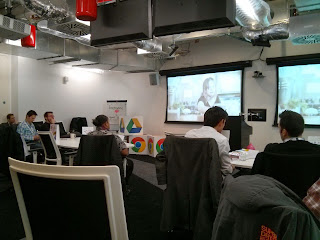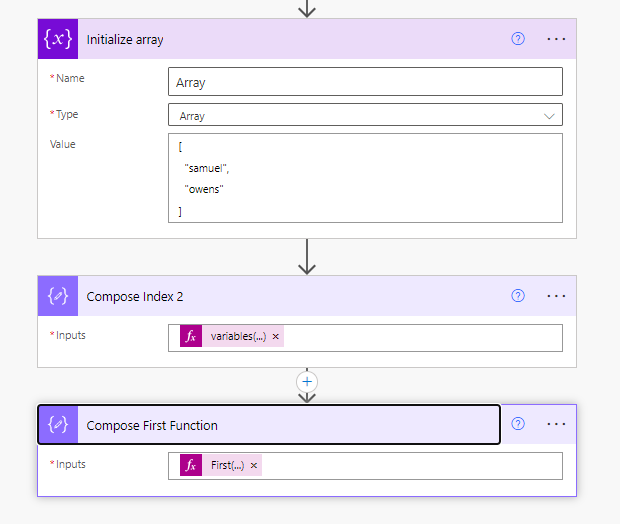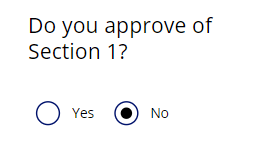Visit to Google - Google Apps
This week I visited the Google offices near Tottenham Court
Road to see how businesses are using the Google Apps Platform.
The event was run by a company called Netpremacy. They have an offering called AppsCare which is specifically designed for helping companies move from a hosted Exchange or Lotus environment to a fully hosted Google Apps environment.
Google being Google, the offices couldn't be a simple affair! They have huge shagpile carpets of the Google Chrome icon and a very industrial effect in the Seminar room the event was held in.
Anyway, enough of the fancy dan stuff, how was the day?
Well it was great, hugely thought provoking and left me questioning a lot of decisions we as Systems Administrators, Engineers and Architects generally make.
I generally like the Google offering, I use Gmail and have recently purchased 100GB of Google Drive space when they announced their huge price cuts.
http://lifehacker.com/prices-for-monthly-google-drive-storage-plans-dropped-m-1543138182
From a work perspective I was always a little sceptical of how it good it would be. This seminar was a great opportunity to talk with other customers who are similar to us, talk to the experts who have migrated many customers over to Google and Just Eat (the online takeaway aggregate system) were there to provide an overview of how moving to Google Apps has really empowered their business.
http://www.netpremacy.com/google-case-stories/just-eat-case-study/
The Apps platform contains the following features (among others)
Gmail - Email....simple.....but excellent.
Drive - File Storage, including rich based users forms, similar to Survey Monkey. Also allows easy sharing of documents for collaboration.
Google Docs - Web based applications to create, edit and view office styled documents.
Hangouts - IM and VC for staff to collaborate.
Maps - Businesses can use the Mapping APIs to help boost their business logistics.
Sites - Build drag and drop websites for your staff.
Google+ - Social Network for work.
So let's look at the Pros and Cons of going Google in the workplace
Pros
Scalability - The Google platform has been built with scale in mind. This means that if your business employs another 300 staff at short notice or you acquire another company, you can easily add these users to your Google Apps company. This is extremely attractive because it takes a huge headache away from Architects and Administrators who need to tweak existing systems every 6 months when the business change their plans.
Cost - At £33 per user per year the offering is excellent. Each user gets 30GB for Gmail and Google Drive (which can be upgraded)
Consumer Lead - Gmail is the one of the most used email systems used across the world. Most users are comfortable with the platform. Taking this into the business will probably be easy for the majority of users.
Collaboration - The Google platform allows users to collaborate using Gmail, Hangouts for IM and VC and Google+ for a Intranet Facebook style platform. This is great for companies who don't fancy buying and configuring separate products e.g. Configuring Microsoft Lync is NOT simple!
Cons
Compatibility - The Google docs platform is excellent, however there are bound to be things which do not play ball with the Microsoft Office package. I can imagine how frustrated Finance and Legal departments might get when trying to use Google Docs instead of Word and Excel. The upside is that you can still use the Office package for editing, but it is an extra cost.
Data Access - For VDI or SBC platforms it makes sense to have Exchange and file storage in the datacentre next to their Citrix or VMware environment for speed. Moving this data into the cloud starts to dilute this platform. Also trying to use Legacy desktop apps to access and edit files in Gmail and Google Drive might not be very easy, if possible at all in some circumstances.
Revenue cost - This one is curious. Many companies have been used to allocating spend in capital terms with a small amount of support and maintenance each year. Google Apps and many other platforms these days are charging per user per year. This is not wrong, but a shift in the way of thinking for many IT and Finance departments.
Change - It is a huge change! If the company is not behind the project, it is destined to fail.
There are lots of other Pros and Cons but these are the main things. To put things into perspective I made notes of all of the system costs which could be reduced or eliminated by going Google. The list was pretty large by the end of the day! Every time I added another item it made me steer toward Google.
Exchange Licences, Hardware, Support
Office Licences, Support
File System Hardware, Support
Video Conferencing Licences, Hardware, Support
Lync Licences, Hardware, Support
Sharepoint Licences, Hardware, Support
Intranet Licences, Hardware, Support
Anti Spam Licences
Backup Licences, Hardware, Support
BYOD Licences, Hardware, Support
All of this for £33 per user per year..........................It is hard to argue!
Conclusion
I think small companies and start-ups will flock to the Google Apps platform. It just doesn't make financial sense for these type of companies to worry about configuring hardware, software, making it highly available etc.
For the larger organisation it is a different story. It would require buy-in from the very top. If the CEO is not on board then the project will fail.
Does your company use Google Apps? How is it for you?
Sam
The event was run by a company called Netpremacy. They have an offering called AppsCare which is specifically designed for helping companies move from a hosted Exchange or Lotus environment to a fully hosted Google Apps environment.
Google being Google, the offices couldn't be a simple affair! They have huge shagpile carpets of the Google Chrome icon and a very industrial effect in the Seminar room the event was held in.
Anyway, enough of the fancy dan stuff, how was the day?
Well it was great, hugely thought provoking and left me questioning a lot of decisions we as Systems Administrators, Engineers and Architects generally make.
I generally like the Google offering, I use Gmail and have recently purchased 100GB of Google Drive space when they announced their huge price cuts.
http://lifehacker.com/prices-for-monthly-google-drive-storage-plans-dropped-m-1543138182
From a work perspective I was always a little sceptical of how it good it would be. This seminar was a great opportunity to talk with other customers who are similar to us, talk to the experts who have migrated many customers over to Google and Just Eat (the online takeaway aggregate system) were there to provide an overview of how moving to Google Apps has really empowered their business.
http://www.netpremacy.com/google-case-stories/just-eat-case-study/
The Apps platform contains the following features (among others)
Gmail - Email....simple.....but excellent.
Drive - File Storage, including rich based users forms, similar to Survey Monkey. Also allows easy sharing of documents for collaboration.
Google Docs - Web based applications to create, edit and view office styled documents.
Hangouts - IM and VC for staff to collaborate.
Maps - Businesses can use the Mapping APIs to help boost their business logistics.
Sites - Build drag and drop websites for your staff.
Google+ - Social Network for work.
So let's look at the Pros and Cons of going Google in the workplace
Pros
Scalability - The Google platform has been built with scale in mind. This means that if your business employs another 300 staff at short notice or you acquire another company, you can easily add these users to your Google Apps company. This is extremely attractive because it takes a huge headache away from Architects and Administrators who need to tweak existing systems every 6 months when the business change their plans.
Cost - At £33 per user per year the offering is excellent. Each user gets 30GB for Gmail and Google Drive (which can be upgraded)
Consumer Lead - Gmail is the one of the most used email systems used across the world. Most users are comfortable with the platform. Taking this into the business will probably be easy for the majority of users.
Collaboration - The Google platform allows users to collaborate using Gmail, Hangouts for IM and VC and Google+ for a Intranet Facebook style platform. This is great for companies who don't fancy buying and configuring separate products e.g. Configuring Microsoft Lync is NOT simple!
Cons
Compatibility - The Google docs platform is excellent, however there are bound to be things which do not play ball with the Microsoft Office package. I can imagine how frustrated Finance and Legal departments might get when trying to use Google Docs instead of Word and Excel. The upside is that you can still use the Office package for editing, but it is an extra cost.
Data Access - For VDI or SBC platforms it makes sense to have Exchange and file storage in the datacentre next to their Citrix or VMware environment for speed. Moving this data into the cloud starts to dilute this platform. Also trying to use Legacy desktop apps to access and edit files in Gmail and Google Drive might not be very easy, if possible at all in some circumstances.
Revenue cost - This one is curious. Many companies have been used to allocating spend in capital terms with a small amount of support and maintenance each year. Google Apps and many other platforms these days are charging per user per year. This is not wrong, but a shift in the way of thinking for many IT and Finance departments.
Change - It is a huge change! If the company is not behind the project, it is destined to fail.
There are lots of other Pros and Cons but these are the main things. To put things into perspective I made notes of all of the system costs which could be reduced or eliminated by going Google. The list was pretty large by the end of the day! Every time I added another item it made me steer toward Google.
Exchange Licences, Hardware, Support
Office Licences, Support
File System Hardware, Support
Video Conferencing Licences, Hardware, Support
Lync Licences, Hardware, Support
Sharepoint Licences, Hardware, Support
Intranet Licences, Hardware, Support
Anti Spam Licences
Backup Licences, Hardware, Support
BYOD Licences, Hardware, Support
All of this for £33 per user per year..........................It is hard to argue!
Conclusion
I think small companies and start-ups will flock to the Google Apps platform. It just doesn't make financial sense for these type of companies to worry about configuring hardware, software, making it highly available etc.
For the larger organisation it is a different story. It would require buy-in from the very top. If the CEO is not on board then the project will fail.
Does your company use Google Apps? How is it for you?
Sam





Great post Sam, a really interesting read!!
ReplyDelete